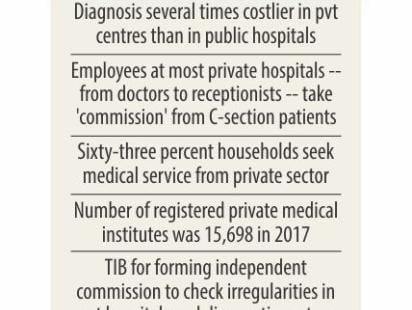Target profit, not service
Private hospitals and diagnostic centres have turned into “excessive profit-seeking businesses” due to a lack of government monitoring, says a new Transparency International Bangladesh study.
Over the course of time, these healthcare facilities have established a “commission-based marketing mechanism” where everyone -- from physicians to receptionists -- benefits from the widespread malpractice, it says.

In most of the cases, the patients, despite paying excessive fees, do not get proper healthcare services in return.
“The booming private healthcare sector has helped more people have access to medical services, but those who are involved in the private healthcare services are trying to turn the facilities into business outlets,” said TIB Executive Director Iftekharuzzaman.
A privately-owned organisation will be profit-oriented, but there has to be some standards, he said. “These standards are not being maintained.”
Iftekharuzzaman was speaking at a press conference at the TIB office in the capital's Dhanmondi yesterday. The conference was organised to disclose the study, titled “Private Medical Service: Challenges of Good Governance and Ways Forward”.
The research for the study was conducted on 66 private hospitals and 50 diagnostic centres across the country between January and December last year. Of those, 26 were in Dhaka metropolitan areas.
According to the study report, 63.3 percent of the households of the country take medical services from the private sector.
Citing Health Bulletin-2015 of the Directorate General of Health Services (DGHS), the study also says 60.3 percent of the doctors are involved in the private healthcare services.
The number of privately-owned registered healthcare facilities increased to 15,698 in 2017 from just 33 in 1982.
The study further says a patient pays Tk 300 to have a lipid profile done at a government hospital while the same test costs between Tk 700 and Tk 1,650 at private diagnostic centres.
The cost for platelet test is Tk 50 at a public hospital but it ranges between Tk 70 and Tk 500 at those diagnostic centres.
For serum creatinine and serum calcium tests, patients have to spend Tk 50 and Tk 80 respectively at government hospitals. But at the centres, the costs become Tk 210 to Tk 580 and Tk 210 to Tk 700 respectively.
The fee for ultrasonogram at the government hospitals is Tk 210 but the same test costs Tk 550 to Tk 800 at private diagnostic centres, the study says.
Physicians, health assistants, family planning employees, rural doctors, pharmacy owners, midwives, receptionists, rickshaw-pullers, and middlemen are involved in the “commission-based” marketing mechanism”, it says.
With verbal agreements, they receive from “15 to 50 percent commission” from the diagnostic centres. For each Caesarian section patient, these beneficiaries get Tk 500 to Tk 5,000 as commission, the study says.
It also says many service seekers, mainly those from outside Dhaka, are harassed by middlemen, who provided them with false information and forcibly take them to private hospitals and centres.
The service seekers also alleged that they had been forced to buy additional medicines. Later, the authorities of the facilities sold those medicines to other patients.
The TIB study has found that the owners of these hospitals and diagnostic centres include police officials, physicians, their wives, nurses, public representatives, politicians, journalists, expatriates, businesspersons, corporate groups, and retired public service officials.
During the research, a TIB team has also found that round-the-clock doctor services were not available at 52 of the 66 hospitals. Twenty-four-hour nurse services were not available at 53 hospitals while cleaners were not available at 29 hospitals all the time.
The team also alleged that low-quality and date-expired reagents were used for conducting many tests there.
Again, most of the surveyed facilities started their operation without even obtaining the mandatory registration. Of the 116 hospitals and diagnostic centres, 97 did not obtain any certificate from the Department of Environment, it adds.
Most of those facilities did not maintain waste-management system accordingly while unhygienic ambience was apparent in 32.
The anti-corruption watchdog strongly recommended that the government forms an independent commission to check the irregularities.
It also suggested the regulatory authorities like the DGHS and the Bangladesh Medical and Dental Council (BMDC) to increase their organisational capacity at central and field level to have better inspection capabilities.
The TIB also recommended that the authorities like the DGHS takes steps to identify the unregistered institutions and take legal action against them.
It also recommended that the BMDC increase its monitoring across the country to stop the “unethical publicity stunts” by some doctors.
Speaking at the press conference, TIB Trustee Board Chairperson Sultana Kamal said better service could be ensured in the health sector if responsible persons show due dedication and do their duties accordingly.



 For all latest news, follow The Daily Star's Google News channel.
For all latest news, follow The Daily Star's Google News channel.
Comments